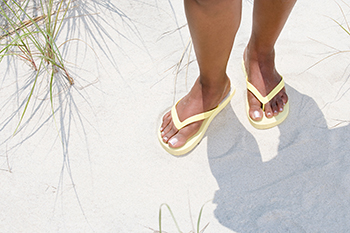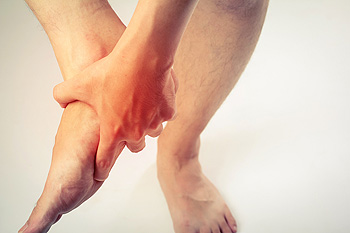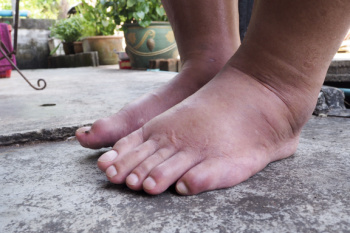Connect With Us
Blog
Items filtered by date: June 2025
What Flip Flops Might Be Doing to Your Feet

Flip flops may feel like the perfect warm-weather footwear, but they offer very little in terms of support or protection. With thin soles and little or no structure around the heel or arch, they allow the foot to flatten unnaturally. This can lead to strain in the arch, heel, or ankle. Because there is no back to hold the foot in place, toes grip the shoe with each step, which may cause fatigue or contribute to tendon issues over time. Flip flops also leave the foot exposed, making stubbed toes, cuts, and sunburn more likely. For people with plantar fasciitis or flat feet, regular use can worsen symptoms. If you are experiencing foot pain that may be related to your footwear choices, it is suggested that you schedule an appointment with a podiatrist for a diagnosis and appropriate treatment.
Flip-flops can cause a lot of problems for your feet. If you have any concerns about your feet or ankles, contact the foot specialists from Academy Foot and Ankle Specialists. Our doctors will assist you with all of your foot and ankle needs.
Flip-Flops and Feet
Flip-flops have managed to become a summer essential for a lot of people. While the shoes may be stylish and easy to slip on and off, they can be dangerous to those who wear them too often. These shoes might protect you from fungal infections such as athlete’s foot, but they can also give you foot pain and sprained ankles if you trip while wearing them.
When Are They Okay to Wear?
Flip-flops should only be worn for very short periods of time. They can help protect your feet in places that are crawling with fungi, such as gym locker rooms. Athlete’s foot and plantar warts are two common fungi that flip-flops may help protect your feet against.
Why Are They Bad for My Feet?
These shoes do not offer any arch support, so they are not ideal for everyday use. They also do not provide shock absorption or heel cushioning which can be problematic for your feet. Additionally, you may suffer from glass cuts, puncture wounds, and stubbed toes since they offer little protection for your feet.
More Reasons Why They Are Bad for Your Feet
- They Slow You Down
- May Cause Blisters and Calluses
- Expose Your Feet to Bacteria
If you have any questions, please feel free to contact our offices located in Southlake, Keller (Fort Worth), Hurst, North Richland Hills, Flower Mound, Argyle, and Denton, TX. . We offer the newest diagnostic and treatment technologies for all your foot care needs.
Arthritis Can Cause Pain in the Feet and Ankles
Managing Discomfort From Plantar Heel Pain

Plantar heel pain refers to discomfort at the bottom of the heel, often caused by irritation or inflammation of the soft tissues that support the foot. Common causes include overuse, poor footwear, excess weight, or abnormal foot mechanics. The pain is typically sharp and felt with the first steps in the morning or after periods of rest. Staying active within comfort limits is important, as movement helps maintain circulation and flexibility. A podiatrist can evaluate the cause of the pain, provide custom orthotics, suggest stretching routines, and recommend footwear for support. If you are experiencing ongoing heel pain, it is strongly suggested that you contact a podiatrist who can guide you through effective solutions to reduce discomfort and support daily activity.
Many people suffer from bouts of heel pain. For more information, contact the foot specialists of Academy Foot and Ankle Specialists. Our doctors can provide the care you need to keep you pain-free and on your feet.
Causes of Heel Pain
Heel pain is often associated with plantar fasciitis. The plantar fascia is a band of tissues that extends along the bottom of the foot. A rip or tear in this ligament can cause inflammation of the tissue.
Achilles tendonitis is another cause of heel pain. Inflammation of the Achilles tendon will cause pain from fractures and muscle tearing. Lack of flexibility is also another symptom.
Heel spurs are another cause of pain. When the tissues of the plantar fascia undergo a great deal of stress, it can lead to ligament separation from the heel bone, causing heel spurs.
Why Might Heel Pain Occur?
- Wearing ill-fitting shoes
- Wearing non-supportive shoes
- Weight change
- Excessive running
Treatments
Heel pain should be treated as soon as possible for immediate results. Keeping your feet in a stress-free environment will help. If you suffer from Achilles tendonitis or plantar fasciitis, applying ice will reduce the swelling. Stretching before an exercise like running will help the muscles. Using all these tips will help make heel pain a condition of the past.
If you have any questions please contact our offices located in Southlake, Keller (Fort Worth), Hurst, North Richland Hills, Flower Mound, Argyle, and Denton, TX. . We offer the newest diagnostic and treatment technologies for all your foot and ankle needs.
Exercises for Achilles Tendon Rehab

The Achilles tendon connects the calf muscles to the heel and is essential for walking, running, and jumping. When this tendon becomes overused or strained, it can lead to Achilles tendinitis, which causes swelling and pain at the back of the ankle. A podiatrist may recommend rehabilitation exercises to promote healing and restore strength. One key movement is the eccentric heel drop, which involves rising up on both feet and then slowly lowering the body down using only the injured leg. This helps lengthen and strengthen the tendon under controlled tension, improving resilience without excessive strain. Other useful exercises include towel stretches to loosen the calf and plantar fascia, step-ups to rebuild balance, and toe raises to improve foot control. These exercises should be performed gradually and with care to avoid further Achilles tendon damage. A podiatrist can track your recovery, recommend modifications, and determine if further treatment is needed. If you have sustained an Achilles tendon injury, it is suggested that you schedule an appointment with a podiatrist for an exam and appropriate treatment options.
Achilles tendon injuries need immediate attention to avoid future complications. If you have any concerns, contact the foot specialists of Academy Foot and Ankle Specialists. Our doctors can provide the care you need to keep you pain-free and on your feet.
What Is the Achilles Tendon?
The Achilles tendon is a tendon that connects the lower leg muscles and calf to the heel of the foot. It is the strongest tendon in the human body and is essential for making movement possible. Because this tendon is such an integral part of the body, any injuries to it can create immense difficulties and should immediately be presented to a doctor.
What Are the Symptoms of an Achilles Tendon Injury?
There are various types of injuries that can affect the Achilles tendon. The two most common injuries are Achilles tendinitis and ruptures of the tendon.
Achilles Tendinitis Symptoms
- Inflammation
- Dull to severe pain
- Increased blood flow to the tendon
- Thickening of the tendon
Rupture Symptoms
- Extreme pain and swelling in the foot
- Total immobility
Treatment and Prevention
Achilles tendon injuries are diagnosed by a thorough physical evaluation, which can include an MRI. Treatment involves rest, physical therapy, and in some cases, surgery. However, various preventative measures can be taken to avoid these injuries, such as:
- Thorough stretching of the tendon before and after exercise
- Strengthening exercises like calf raises, squats, leg curls, leg extensions, leg raises, lunges, and leg presses
If you have any questions please feel free to contact our offices located in Southlake, Keller (Fort Worth), Hurst, North Richland Hills, Flower Mound, Argyle, and Denton, TX. . We offer the newest diagnostic tools and technology to treat your foot and ankle needs.
Causes and Symptoms of Swollen Feet

Swollen feet and ankles can stem from a range of medical causes, including lymphedema, infections, trauma, diabetes, and blood clots. Swelling may also be due to fluid buildup from prolonged sitting or standing, or complications from pregnancy. One-sided swelling may point to infection, such as cellulitis, or a blocked vein caused by a clot. Lymphedema, which results from fluid buildup in the tissues, can be either hereditary or caused by other medical conditions. Diabetes can cause swelling through fluid retention or secondary infection. Signs of swollen feet may include puffiness, pain, redness, or warmth, depending on the underlying issue. Trauma-related swelling may call for surgery, especially in cases of compartment syndrome. This occurs when pressure builds within a closed muscle compartment, reducing blood flow and potentially causing tissue damage. A podiatrist can evaluate these symptoms, identify the cause of swelling, and recommend appropriate treatment. If you notice that your feet or ankles are swollen, it is suggested that you schedule an appointment with a podiatrist for a diagnosis and treatment.
Swollen feet can be a sign of an underlying condition. If you have any concerns, contact the foot specialists of Academy Foot and Ankle Specialists. Our doctors can provide the care you need to keep you pain-free and on your feet.
Swollen feet are a common ailment among pregnant women and people who stand or sit for extended periods. Aging may increase the possibility of swollen feet and patients who are obese often notice when their feet are swelling too. There may be medical reasons why swollen feet occur:
- Phlebitis - A condition that causes the veins to become inflamed and can also cause leg pain.
- Liver disease - This may lead to low blood levels of albumin which is a protein. This can cause fluid in the blood to pass into the tissues and several areas of the body can become swollen.
- Heart failure - When the heart doesn’t pump properly the blood that is normally pumped back to the heart can pool in the veins of the legs causing swollen feet.
- Kidney disease - One of the main functions of the kidneys is releasing excess fluid in the body. This type of condition can make it difficult for the kidneys to function properly, and as a result the feet may become swollen.
- Deep-vein thrombosis (DVT)- This is a serious condition where blood clots form in the veins of the legs. They can block the return of blood from the legs to the heart which may cause the feet to swell. It is important to be treated by a podiatrist if this condition is present.
Swollen feet can also be caused by bone and tendon conditions, including fractures, arthritis, and tendinitis. Additionally, there may be skin and toenail conditions and an infection may cause the feet to swell. Patients who take medicine to treat high blood pressure may be prone to getting swollen feet.
Many patients elevate their feet to help relieve the swelling and this is generally a temporary remedy. When a podiatrist is consulted the reason behind the swelling can be uncovered and subsequently treated.
If you have any questions please feel free to contact our offices located in Southlake, Keller (Fort Worth), Hurst, North Richland Hills, Flower Mound, Argyle, and Denton, TX. . We offer the newest diagnostic tools and technology to treat your foot and ankle needs.

